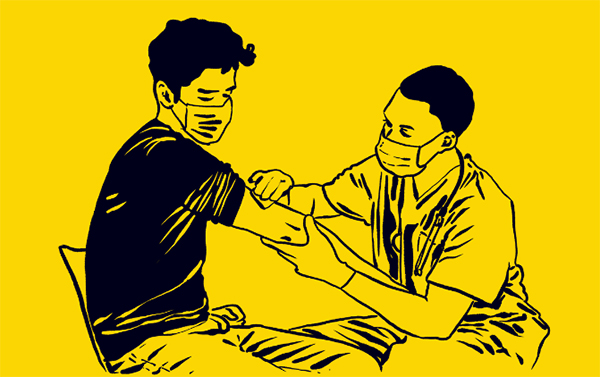Home »

Vaccines available for those at higher risk of severe illness
Starting Tuesday, April 8, free additional COVID-19 vaccines will be available to people in B.C., with a focus on those who are at higher risk of severe illness.
The spring COVID-19 vaccine will be available throughout the province at approximately 400 pharmacies, as well as regional health-authority clinics, some primary-care offices, community health centres, long-term care homes and First Nations communities. Public health units will also have vaccine available for children under 12.
“While the peak of respiratory illnesses has passed, influenza, COVID-19 and RSV are still here, and we must continue to practise healthy habits to keep illnesses from spreading,” said Dr. Bonnie Henry, provincial health officer for British Columbia. “This is particularly important as spring break ends, a period when many people have been travelling. This is a reminder to stay home if you are sick, and if you need medical care, to call ahead so you can be seen safely.”
“For people at the highest risk of serious illness, an extra dose of the COVID-19 vaccine can boost their immunity through the spring and summer,” said Josie Osborne, Minister of Health. “That’s why notifications to priority populations will go out starting April 8.”
Based on guidance from the National Advisory Committee on Immunization, B.C. health officials recommend that the following people receive an additional dose of COVID-19 vaccine this spring:
* adults 65 years and older, with a particular focus on people over 80 years;
* Indigenous adults 55 years and older;
* adult residents of long-term care homes and assisted-living facilities (including those awaiting placement); and
* individuals six months and older who have been diagnosed as clinically extremely vulnerable (a CEV 1 or CEV 2).
Notifications to book appointments will be sent out to priority populations beginning April 8. The spring vaccine program will end on June 30.
Anyone else who feels they would benefit from an additional dose of the COVID-19 vaccine can consult with their health-care provider, contact the call centre at 1 833 838-2323 to book an appointment or call a pharmacy for availability.
With an increasing number of measles cases reported in B.C. and the resurgence of measles cases worldwide, public health officials are encouraging people in B.C. to check their immunization records to ensure they are up to date with their measles immunization by going on Health Gateway or connecting with their health-care provider, and if needed, to book an appointment to get a free measles vaccine.
Officials are also reminding people to monitor for symptoms if they have recently travelled. To date, five cases of measles have been reported in the province, all in the Lower Mainland and all related to travel to areas in the world where measles outbreaks are occurring.
“Increasingly, we’re seeing cases of measles in parts of Canada, with outbreaks in Ontario and cases here in B.C., and around the world,” said Dr. Henry. “Measles can cause serious illness, particularly for young people who are not vaccinated. And we have tragically had one death in Canada last year.”
Measles is an extremely contagious virus that can cause severe complications, including pneumonia, encephalitis (inflammation of the brain), and even death. People who are most at risk from measles are those who are completely unvaccinated against the disease and who have no immunity from past exposures.
“As we’re seeing an increase in cases of measles in B.C. and around the world, people need to make sure their measles immunizations are up to date and that they follow healthy habits,” said Osborne. “It is easy and free to get the measles vaccine, to protect yourself and your loved ones from this serious virus.”
Adults born in 1970 or later should ensure they have received two doses of a measles-containing vaccine as one dose is not enough to ensure adequate protection. Adults born before 1970 are generally assumed to have acquired immunity to measles from exposure to measles before immunization was widely available.
In B.C., children are routinely provided with two doses of a measles-containing vaccine with the first dose of measles, mumps and rubella (MMR) vaccine given at 12 months and the second dose of measles, mumps, rubella and varicella (MMRV) vaccine given at four to six years.
Children from six months of age travelling to parts of the world where measles is more common can receive MMR vaccine prior to departure. They will then require two doses of vaccine after they reach 12 months to be fully protected. Children between one and four years can also get their second dose early if travelling to areas where measles is spreading.
People can get free measles vaccines from their local health unit or health centre. Some doctors and nurse practitioners also offer vaccines to infants, children and adults. Children 4 years and older, as well as adults, can be vaccinated at a pharmacy. In First Nations communities, people can also be immunized by their community health nurse at their community health centre or nursing station.
What to know about spring COVID-19 vaccine program
The latest epidemiological data trends show that respiratory illnesses in B.C. are low or decreasing. On Friday, March 28, Dr. Bonnie Henry, provincial health officer, declared the end of the 2024-25 respiratory illness season. So, extra measures in health-care facilities are no longer required. This is a decision informed by low levels of respiratory illness seen in the most recent data provided by the BC Centre for Disease Control.
People are still encouraged to wear medical masks in health-care settings as appropriate, and to continue to practise healthy habits, such as covering coughs and sneezes, staying away from others when feeling sick and cleaning hands. People should continue to seek appropriate medical care if they are ill. Health-care workers will continue to wear appropriate personal protective equipment, such as medical masks and respirators, when additional precautions are required and in accordance with their point-of-care risk assessments.
This spring COVID-19 immunization program will use the same COVID-19 vaccine in place during the latest respiratory illness season, which is the updated mRNA vaccines targeting the KP.2 COVID-19 subvariant.
The 2024-25 respiratory illness immunization campaign was launched to the general population on Oct. 15. As of end of day on Monday, March 24, B.C. has administered more than 1.1 million doses of COVID-19 vaccines and more than 1.34 million doses of influenza vaccines.
What to know about cases of measles in B.C.
Measles is an extremely contagious virus that can cause severe complications, including pneumonia, encephalitis (inflammation of the brain), and even death. It is a highly contagious virus that can spread through air. People can pass the virus to others before they show symptoms and the virus can stay suspended in the air in a room for several hours.
Symptoms of measles include fever, cough, runny nose and conjunctivitis. Three to four days after the onset of fever, a rash develops, generally it begins on the face, then spreads rapidly to the rest of the body.
There has been a resurgence of measles in Canada in recent years, with several hundred confirmed cases officially reported nationally so far in 2025 (and more expected for March 2025) and 146 cases in 2024, with cases occurring largely in people who were not immunized or under immunized. There is also significant measles transmission in many parts of the world, including Europe, Asia and Africa.
In B.C., measles vaccine is provided as measles, mumps and rubella (MMR) vaccine and is recommended for children beginning at the first birthday. A second dose, generally with MMR and varicella vaccine (MMRV), is given at school entry (four to six years).
How to check your immunization records?
* Check the immunization records from adults and children through the Health Gateway.
* If the records are not in the Health Gateway:
* Adults and children may have received a paper record at the time of immunization. For example, in B.C., immunizations may be recorded in the Child Health Passport.
* If the immunization record is incomplete in Health Gateway and people have a paper record, they can submit the record.
* If people don’t have a paper record, they can: Contact the health-care provider that gave the vaccines.
* Contact the community health nurse if the vaccines were given in a First Nations community.
* If people have moved to B.C. from another province or country, contact the immunization provider or local public health unit and ask to have the records sent to them.
Ministry of Health image
e-KNOW







